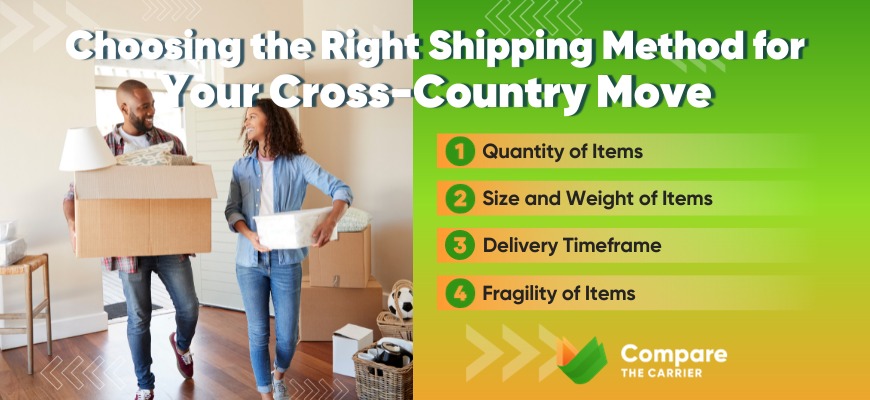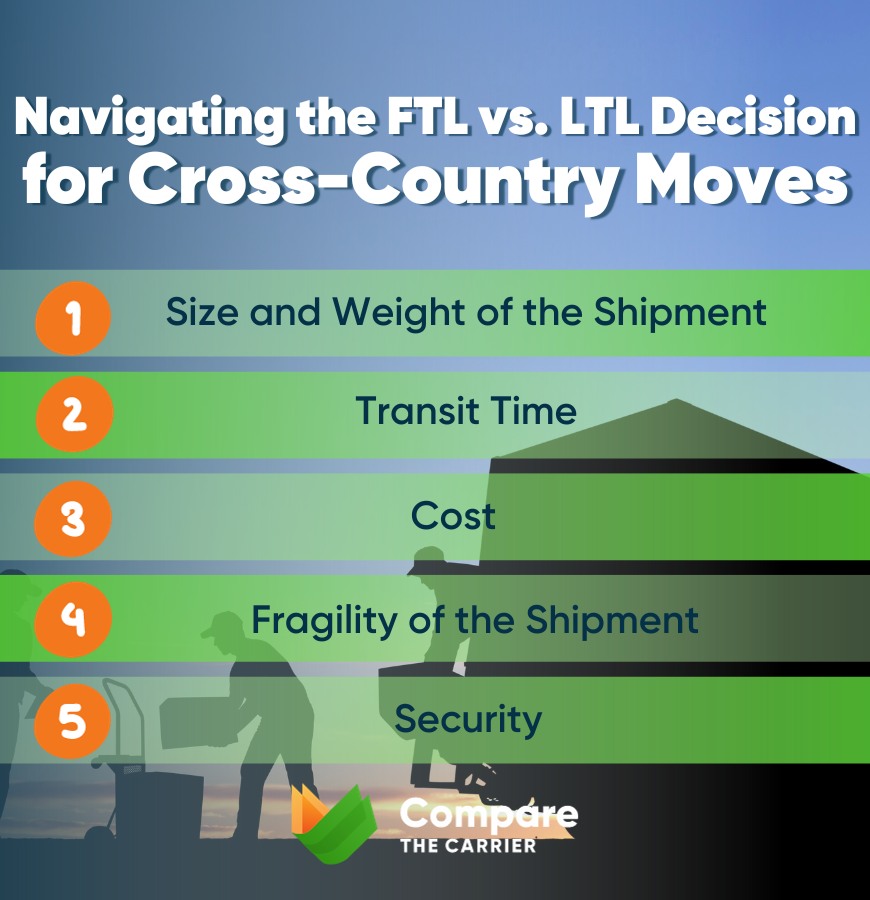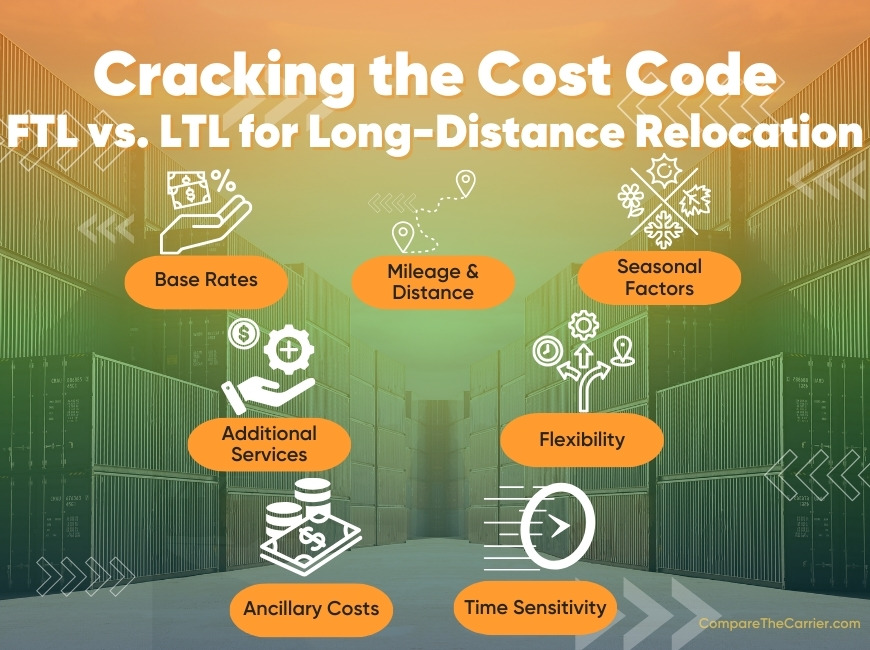The open American road beckons, but before setting those wheels in motion, there’s a big decision waiting in the driveway: Should you opt for FTL or LTL when relocating your vehicle across our great nation?
It’s like choosing between apple pie and blueberry cobbler – both are great, but one might be better suited for you.
Whether you’re transporting your entire household or a few treasured items, Compare The Carrier cuts through the complexity of FTL and LTL shipping.
Let’s unravel the options and find the strategy that lets you breathe easy while your belongings make their way across the miles.
Identifying Your Shipping Needs
When it comes to cross-country moves, identifying your shipping needs is crucial in determining whether FTL or LTL shipping is the best option for you. Here are some aspects to consider when deciding between the two:

Quantity of Items
If you have a large number of items to move, FTL transport may be the better option. With FTL, you have the entire truck to yourself, allowing you to transport all your items in one go. On the other hand, if you have a smaller number of items, LTL shipping may be more cost-effective as you only pay for the space your items take up in the truck.
Size and Weight of Items
FTL shipping is ideal for larger and heavier items as you can fill up the entire truck with your items. LTL shipping, on the other hand, is better suited for smaller and lighter items as they can be grouped with other shipments to fill up the truck.
Delivery Timeframe
If you need your items delivered quickly, FTL transport may be the better option. Since you have the entire truck to yourself, there are no stops along the way to pick up or drop off other shipments, which can delay delivery. However, if you have a more flexible timeframe, LTL shipping may be more cost-effective as it may take longer to reach your destination due to stops along the way.
Fragility of Items
If you have fragile items that require special handling, FTL transport may be the better option as you have more control over how your items are loaded and unloaded. However, if your items are not fragile, LTL shipping may be more cost-effective as the cost is shared among multiple shipments.
By considering these factors, you can determine whether FTL or LTL shipping is the best option for your cross-country move. And always remember, whatever your needs, platforms like Compare The Carrier are just around the digital corner to help you make an informed, confident decision for that big move.
Factors Steering the FTL or LTL Decision
When it comes to cross-country moves, choosing between FTL and LTL shipping can be a daunting task. There are several factors to consider before making the final decision:

Size and Weight of the Shipment
The size and weight of the shipment are crucial factors that determine whether to choose FTL or LTL shipping. FTL is typically used for large shipments of 10,000 pounds or more that require a full truckload. On the other hand, LTL is suitable for smaller shipments that are less than 10,000 pounds and do not require a full truckload. If your shipment is small, choosing LTL shipping can save you money.
Transit Time
The transit time is another factor that should be considered when making the FTL vs. LTL decision. FTL shipping provides faster delivery times since fewer stops are required, and the shipment does not need to be consolidated with other shipments. LTL shipping, on the other hand, takes longer since the shipment needs to be consolidated with other shipments.
Cost
The cost of shipping is an essential factor to consider when making the FTL vs. LTL decision. FTL transport is generally more expensive than LTL shipping, especially for smaller shipments. However, if you have a large shipment, FTL transport can be more cost-effective than LTL shipping.
Fragility of the Shipment
If your shipment is fragile, you may want to choose FTL shipping instead of LTL shipping. FTL shipping eliminates the need for the shipment to be consolidated with other shipments, reducing the risk of damage during transit. Additionally, FTL shipping provides dedicated service, which means that the shipment is the only one on the truck, reducing the risk of damage.
Security
If you have a high-value shipment that is vulnerable to theft, FTL shipping may be the best option. FTL shipping eliminates the need for the shipment to be consolidated with other shipments, reducing the risk of theft during transit. Additionally, FTL shipping provides dedicated service, which means that the shipment is the only one on the truck, reducing the risk of theft.
Remember, the key is to balance your specific needs with the benefits each option offers. For those leaning towards FTL, understanding how to maximize the truck’s capacity is vital. While delving deeper into this, you might come across strategies that truly optimize FTL freight shipments, ensuring you get the most bang for your buck.
A Deep Dive into Costs
When it comes to long-distance relocation, getting the most value for your dollar is key. The decision between FTL and LTL often boils down to cost factors that can vary widely depending on your unique shipping needs. Let’s break down what plays into the pricing game:

Base Rates
FTL Base Rates:
LTL Base Rates:
Mileage & Distance
Seasonal Factors
Additional Services
Flexibility
Time Sensitivity
Ancillary Costs
So, whether you’re looking at saving pennies or splurging for a more exclusive service, understanding these cost components will help you make a more informed decision. And to aid you through this financial maze, Compare The Carrier offers a reliable compass, making sure your choices are as sound as a dollar.
Navigating the world of long-distance vehicle relocation can seem like driving through a dense fog at times. Whether you’re leaning towards FTL or LTL, it’s crucial to consider your unique shipping needs, budget, timeline, and the level of care your vehicle requires. Each option has its pros and cons, and the right choice varies from one individual to another.
Thankfully, with resources like Compare The Carrier, you’re never alone on this journey. Here’s to smooth roads ahead and the perfect transport solution for your prized wheels. Safe travels!
FAQ
I’m planning a household move. Can I combine moving my household items with my car in an FTL shipment?
Absolutely. FTL gives you exclusive use of the entire truck. If the carrier you’re working with handles both household goods and vehicles, you can often move both simultaneously, maximizing convenience and potentially reducing costs.
Is insurance coverage different between FTL and LTL shipments?
Insurance typically covers the value of the items being transported regardless of the method. However, FTL might offer more comprehensive coverage due to the exclusivity of the service. It’s essential to discuss insurance specifics with your chosen carrier.
What if I need to change my delivery date or location midway?
While changes can be accommodated, they might attract additional fees, especially if the truck needs to be rerouted. It’s essential to communicate any changes as early as possible to your carrier.
Is there a best time of year to schedule a cross-country move for cost savings?
Off-peak seasons, typically during the colder months or outside major holidays, tend to have more competitive rates due to decreased demand. However, always consider other factors like weather conditions that could affect the transport.
Is there a risk of my delivery getting delayed in LTL due to other shipments on the same truck?
While LTL involves multiple pickups and drop-offs, carriers have sophisticated scheduling systems. Delays can occur, but they are generally the exception rather than the rule. Always request an estimated delivery window when booking.
How far in advance should I schedule my move, whether I choose FTL or LTL?
Ideally, give yourself and the carrier at least 2-4 weeks. This allows for better planning and potentially better rates. However, if you’re in a pinch, many carriers offer expedited services.













This comprehensive guide by Compare The Carrier navigates the complexities of choosing between FTL and LTL for cross-country vehicle relocation. By considering factors like shipment size, transit time, cost, fragility, security, and understanding the intricacies of pricing, readers gain valuable insights for informed decisions. A must-read for a smooth and cost-effective long-distance move! Great job!